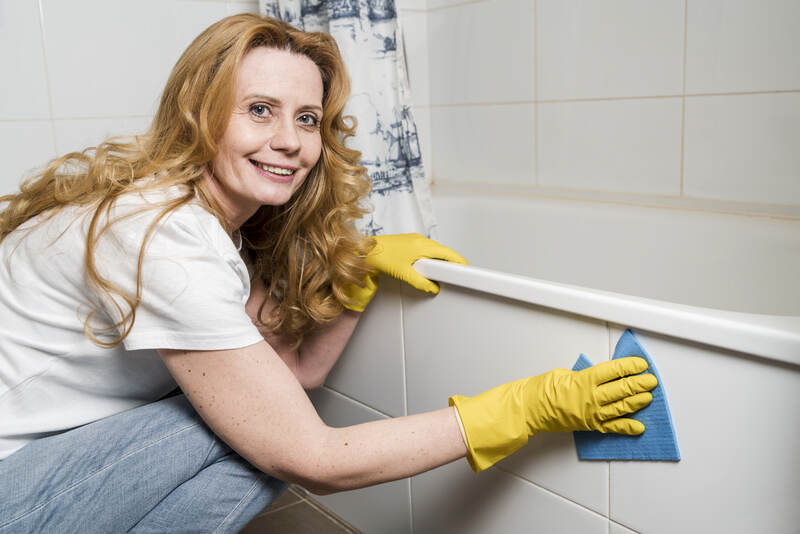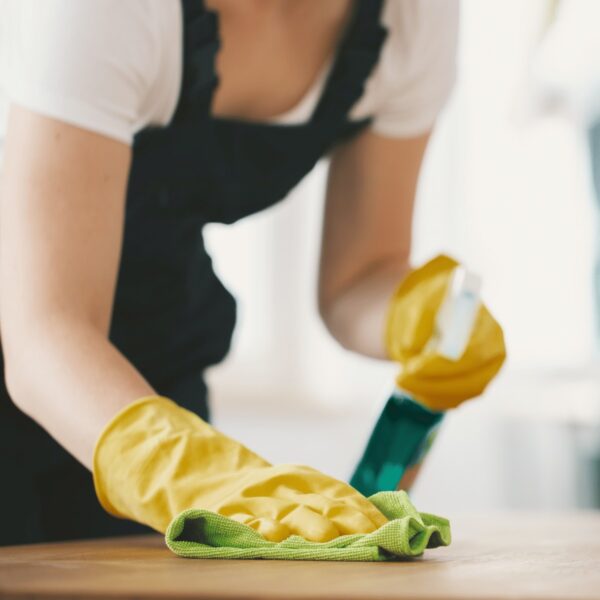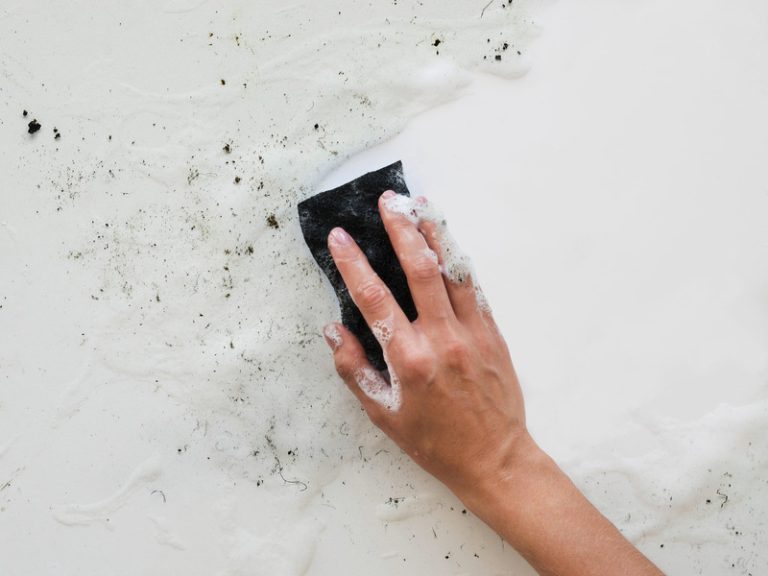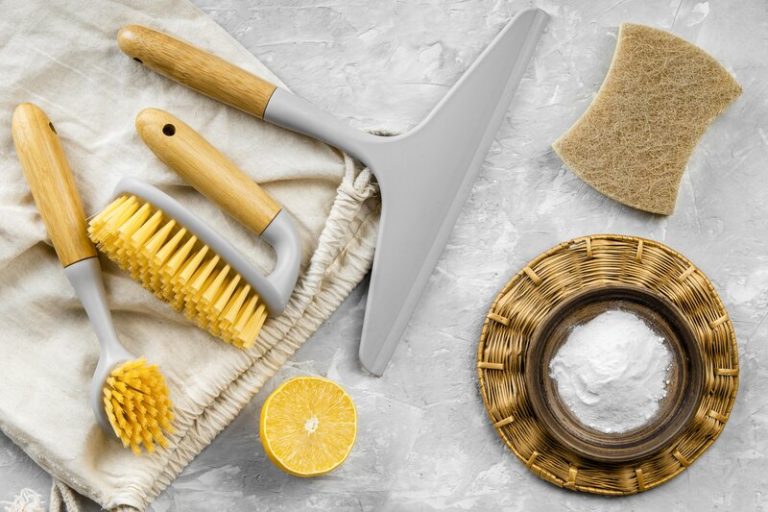How often should you clean your bathtub? Regular cleaning is essential for maintaining both hygiene and the overall appearance of your bathroom. Cleaning your bathtub at least once a week helps prevent soap scum, bacteria buildup, and other unwanted grime from accumulating. This article explores how frequently you should be tackling this task based on factors like how often it’s used and the type of water in your home.
But what happens if you don’t clean your bathtub? Neglecting this important chore can lead to mold growth, unpleasant odors, and even health risks, such as bacterial infections. Keeping your bathtub clean ensures a safer, more enjoyable space, and we’ll provide tips on how to maintain that fresh look with ease.
How Often Should You Clean Your Bathtub?
Regularly cleaning your bathtub is essential to maintaining cleanliness and preventing the build-up of bacteria, soap scum, and mildew. If you’re wondering, “how often should you clean your bathtub?” experts recommend deep cleaning it at least once a week. This schedule ensures that grime and germs don’t accumulate, keeping your bathing area sanitary and safe for daily use.
In addition to improving hygiene, a regular cleaning routine also extends the life of your bathtub by preventing stains, limescale, and mold from forming. A clean tub not only looks better but also reduces the risk of slipping on soap scum and other residues. Consistent maintenance helps protect your investment in bathroom fixtures, ensuring they remain in excellent condition over time.
What Factors Determine How Often You Should Clean Your Bathtub?
The frequency of cleaning depends on various factors, such as how often the tub is used, who is using it, and the material it’s made from. If you’re asking, “how often should you clean your bathtub?” consider elements like moisture levels, the presence of children or pets, and the types of surfaces involved. A busy household with frequent use may require more frequent cleaning.
Bathtubs made of porous materials like natural stone may need extra care, as they tend to absorb moisture and harbor bacteria more easily. Additionally, homes with pets or young children tend to see more dirt and grime in the tub, meaning you’ll need to clean it more often. By understanding these factors, you can establish an ideal cleaning routine that maintains both hygiene and the longevity of your bathtub.
What Happens If You Don’t Clean Your Bathtub?
Neglecting to clean your bath can lead to a variety of serious issues, ranging from:
a. The buildup of Soap Scum and Grime
Neglecting to clean your bathtub results in soap scum buildup, creating an unsightly and unhygienic space. This sticky residue fosters bacteria growth and detracts from your bathroom’s appeal. To answer the question, “how often should you clean your bathtub?” it’s crucial to establish a regular cleaning routine.
Simple practices, like wiping down surfaces and using effective cleaning solutions, can significantly reduce grime and maintain a healthy bathing environment. Investing time in cleaning ensures a safer and more pleasant experience.
b. Growth of Bacteria and Mould
Ignoring your bathtub’s cleanliness can lead to rapid bacterial and mould growth, posing serious health risks. Pathogens thrive in damp environments, increasing the likelihood of skin infections and respiratory issues. Regular cleaning is essential to prevent these dangers and clarifies how often you should clean your bathtub.
To keep mould and bacteria at bay, ensure proper ventilation and use antibacterial products. A consistent cleaning routine helps maintain a safe bathing environment for everyone.
c. Risk of Slips and Falls
An unclean bathtub raises the risk of slips and falls, as soap scum and moisture create slippery conditions. When surfaces are neglected, the chance of accidents increases significantly. Regularly asking, “how often should you clean your bathtub?” can help establish a safety-focused cleaning schedule.
Using effective cleaning solutions not only enhances your bathroom’s appearance but also promotes safety. Incorporating anti-slip mats can further reduce accident risks, creating a safer space for all users.
d. Damage to Bathtub Surfaces
Neglecting to clean your bathtub can lead to irreversible damage, including limescale buildup and deterioration. Establishing a cleaning routine answers the question, “how often should you clean your bathtub?” while preserving your bathtub’s condition.
Using gentle, pH-balanced cleaners and soft sponges is crucial to avoid surface damage. Regular inspections and maintenance extend your bathtub’s lifespan, ensuring it remains a relaxing retreat in your bathroom.
How to Clean Your Bathtub?
Cleaning your bath properly requires a systematic approach that includes:
a. Gather Cleaning Supplies
To clean your bathtub efficiently, gather essential supplies like vinegar, baking soda, a disinfectant, and rubber gloves. Each item plays a crucial role: vinegar acts as a natural disinfectant, while bicarbonate of soda helps scrub and deodorise. Remember, regular cleaning will maintain hygiene and improve your bathtub’s appearance, answering the question of how often should you clean your bathtub.
For a homemade cleaner, mix equal parts vinegar and water for an effective, non-toxic solution. Having the right tools ensures a more thorough and efficient cleaning process.
b. Remove Any Items from the Bathtub
Before cleaning, remove all items from the bathtub, such as mats, shower curtains, and personal products. This step allows for thorough access to all areas, facilitating effective grime removal and ensuring hygiene. Maintaining an organised space simplifies future cleaning and promotes efficiency.
Wash removable items regularly to prevent mould and unpleasant odours. Storing personal products in a caddy keeps the area clutter-free, contributing to a cleaner environment.
c. Apply a Cleaning Solution
After clearing the tub, apply a suitable cleaning solution like vinegar or bicarbonate of soda to break down grime and kill germs. Choosing the right product for your bathtub surface is crucial for effective cleaning. To ensure maximum effectiveness, let the solution sit for the recommended time based on the product.
By tailoring your cleaning approach to the type of surface, you’ll achieve a sparkling clean bathtub, ensuring you’re addressing how often should you clean your bathtub as part of your routine.
d. Scrub the Bathtub Surfaces
Once the cleaning solution has settled, scrub the bathtub using appropriate tools, like a scrubbing brush or microfibre cloth. Selecting the right tool is essential: use soft cloths for enamel and stiff brushes for tougher materials. Focus on removing not just visible dirt but also hidden germs, starting from the edges and moving inward.
Thorough scrubbing and rinsing will help maintain cleanliness while protecting your bathtub’s surfaces, prolonging their lifespan.
e. Rinse and Dry the Bathtub
Rinse the bathtub thoroughly with clean water to remove any cleaning solution residues, then dry the surfaces with clean towels. Neglecting to rinse can lead to soap scum build-up, which attracts dirt and promotes mould growth. This not only affects aesthetics but also poses health risks.
Adopting habits like thorough rinsing and drying will enhance your bathtub’s longevity and keep it inviting for relaxation. Regularly considering how often should you clean your bathtub will help maintain its condition.
Tips for Maintaining a Clean Bathtub
To keep your bath in pristine condition and reduce the need for deep cleaning, it is essential to adopt a few simple maintenance tips that promote a clean bath and overall hygiene.
a. Wipe Down After Each Use
Wiping down your bathtub after each use is an effective method to prevent moisture and germ accumulation. This simple habit helps to minimise the growth of mould and mildew, which thrive in humid environments. By integrating this practice into your routine, you can maintain a hygienic space while making deep cleaning quicker and easier.
b. Use a Drain Cover
Installing a drain cover can significantly reduce debris and hair from clogging your bathtub, helping to prevent mould growth. This essential accessory promotes a healthier bathroom environment by trapping unwanted particles, which improves drainage and simplifies maintenance. Regularly cleaning the drain cover also prevents moisture buildup, further reducing the risk of mildew.
c. Avoid Using Harsh Chemicals
Steering clear of harsh chemicals in cleaning products protects both your bathtub surfaces and your health. Many traditional cleaners contain toxic substances that can linger on surfaces or in the air, posing health risks. Opting for natural alternatives, such as vinegar and baking soda, maintains surface integrity and contributes to a safer home environment.
d. Regularly Deep Clean
Incorporating deep cleaning sessions into your routine is crucial for keeping your bathtub free from soap scum, grime, and harmful germs. Aim to deep clean at least once a month to maintain optimal hygiene and improve the tub’s appearance. Following this schedule not only enhances your bathing experience but also helps prevent mould and mildew growth.
In conclusion, knowing how often should you clean your bathtub is crucial for maintaining a hygienic and pleasant bathing environment. Regular cleaning not only enhances the aesthetic appeal of your bathroom but also prevents the growth of harmful bacteria and the buildup of soap scum.
If you’ve ever wondered what happens if you don’t clean your bathtub, the consequences can be quite alarming—persistent odours, unsightly stains, and even potential health risks from bacteria can detract from what should be a relaxing experience. Instead of tackling this cleaning chore alone, why not leave it to the professionals? TEKA Cleaning offers exceptional residential cleaning services that guarantee a thorough and effective deep clean for your bathtub and bathroom.
Our skilled team uses high-quality products and techniques to ensure every inch sparkles, making your space inviting and safe. Don’t wait until dirt and grime accumulate, contact TEKA Cleaning at 01223 751 544 today. Let us handle the heavy lifting while you enjoy a fresh, clean, and rejuvenating bathing experience! Your health and comfort deserve it!
Read also:











